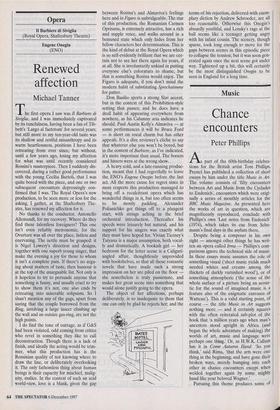Op e ra
Ii Barbiere di Siviglia (Royal Opera, Shaftesbury Theatre) Eugene Onegin (ENO)
Renewed affection
Michael Tanner
T he first opera I saw was II Barbiere di Siviglia, and I was immediately captivated by its tunefulness, having been a fan of Tib- bett's 'Largo al factotum' for several years; but still more to my ten-year-old taste was its shallow and zestful misanthropy and its warm heartlessness, positions I have been retreating from ever since, but without, until a few years ago, losing my affection for what was until recently considered Rossini's masterpiece. Then I suddenly dis- covered, during a rather good performance with the young Cecilia Bartoli, that I was quite bored with the piece, and one or two subsequent encounters depressingly con- firmed that I was. The Royal Opera's new production, to be seen more or less for the asking, I gather, at the Shaftesbury The- atre, has renewed my affection for it.
No thanks to the conductor, Antonello Allernandi, for my recovery. Where do they find these talentless foreigners? This one isn't even reliably metronomic, for the Overture was all over the place, listless and enervating. The nettle must be grasped: it is Nigel Lowery's direction and designs, together with one superb young singer, that make the evening a joy for those to whom it isn't a complete pain. If there's no argu- ing about matters of taste, then humour is at the top of the unarguable list. Not only is it hopeless to try to persuade anyone that something is funny, and usually cruel to try to show them it's not, one also ends by retreating into miserable solipsism. So I shan't mention any of the gags, apart from saying that the couple borrowed from the Ring, involving a large insect climbing up the wall and an outsize gas-ring, are not the high points.
I do find the tone of outrage, as if G&S had been violated, odd coming from critics who revel in something they like to call deconstruction. Though there is a lack of finish, and ideally the acting would be trim- mer, what this production has is the Rossinian quality of not knowing where to draw the line, or deliberately overlooking it. The only fathomless thing about human beings is their capacity for mischief, malig- nity, malice. In the context of such an acid world-view, love is a blank, given the gap
between Rosina's and Almaviva's feelings here and in Figaro is unbridgeable. The star of this production, the Romanian Carmen Oprisanu, is extremely attractive, has a rich and supple voice, and walks around in a bemused state which only hides from her fellow characters her determination. This is the kind of debut at the Royal Opera which is so self-evidently brilliant that we are cer- tain not to see her there again for years, if at all. She is involuntarily unkind in putting everyone else's coloratura to shame, but that is something Rosina would enjoy. The Figaro is adequate, if you don't mind the modern habit of substituting Sprechstimme for patter.
Don Basilio sports a strong Slav accent, but in the context of this Prohibition-style setting that passes; and he does have a droll habit of appearing everywhere from nowhere, as his Calumny aria indicates he should. Paul Austin Kelly's Almaviva — at some performances it will be Bruce Ford — is short on vocal charm but has other appeals. It's a dire reviewer's cliche to say that whatever else you won't be bored, but in the context of Barbiere, as I've indicated, it's more important than usual. The booers and hissers were at the wrong show.
A heavy cold, and a late-running produc- tion, meant that I had regretfully to leave the ENO's Eugene Onegin before the last act. All the more cause for regret since in most respects this production managed to bring off a recalcitrant opera which has wonderful things in it, but too often seems to be mostly padding. Alexander Polianichko got things off to a plangent start, with strings aching in the brief orchestral introduction. Thereafter his speeds were leisurely but natural, and his support for his singers was exactly what they must have hoped for. Vivian Tierney's Tatyana is a major assumption, both vocal- ly and dramatically. A bookish girl — her bedroom for the letter scene is a Caligari- angled affair, thoughtlessly unprovided with bookshelves, so that all those romantic novels that have made such a strong impression on her are piled on the floor she nonetheless is truly passionate, and makes her great scene into something that would alone justify going to the opera.
The object of her affections, perhaps deliberately, is so inadequate to them that one can only be glad he rejects her; and the
terms of his rejection, delivered with exem- plary diction by Andrew Schroeder, are all too reasonable. Otherwise this Onegin's absurdly youthful, and Lensky's rage at the ball seems like a teenager getting angry with his infant cousin. The scenery, though sparse, took long enough to move for the gaps between scenes in this episodic piece to collapse the tension; but it was soon gen- erated again once the next scene got under way. Tightened up a bit, this will certainly be the most distinguished Onegin to be seen in England for a long time.


















































































 Previous page
Previous page